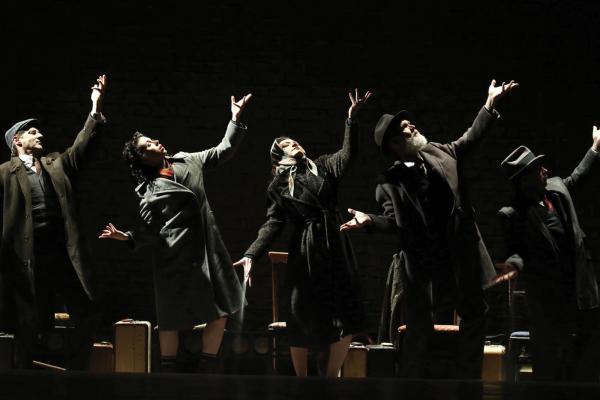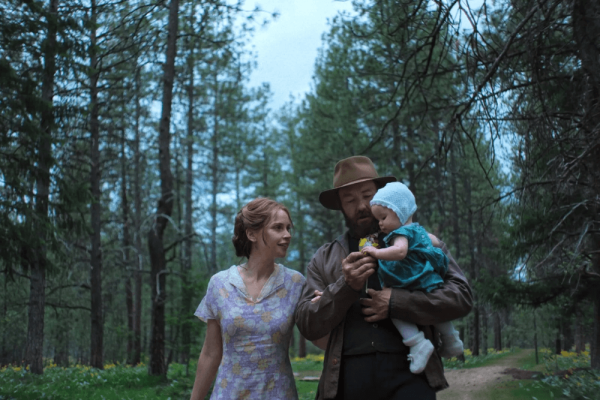PAULA VOGEL WON the 1998 Pulitzer Prize for drama for “How I Learned to Drive” and is a veteran playwright of the American stage. But it wasn’t until 2017 that she finally made her way to Broadway with another of her prize-winning plays: the Tony Award-nominated “Indecent.”
“I wrote it as a love letter to the theater in 2015,” said Vogel, “and I never knew then how the play would resonate as strongly as it does today in these Trumped-up political times.”
“Indecent” tells the story of the theater troupe that performed Sholem Asch’s ill-fated Yiddish play “The God of Vengeance.” Premiering in 1922, “Vengeance” was the first play on Broadway to depict a lesbian love scene, causing a wave of notoriety everywhere it was performed. Asch’s play originated in Poland and tells the story of a Jewish brothel owner’s daughter who falls in love with one of his prostitutes. The father, on discovering his daughter’s forbidden love, throws the Torah down on the stage and banishes his daughter to a life of prostitution.
Asch’s leading actor in Poland warned him not to produce the play, but the play went on a whirlwind tour of success across Europe, finally arriving to New York City’s Greenwich Village in 1922. Despite this, when the show opened on Broadway, it was severely censored. “Why did you agree to those cuts?” the stage manager, Lemml, asks Asch in “Indecent.” “You cut the love between those two girls. There’s only sex left!”
“The God of Vengeance” was shut down, and its actors were arrested and put on trial for obscenity. When found guilty in the New York courts, the immigrant Jewish troupe was shipped back to a war-torn Europe and Nazi-occupied Poland. After the war, Asch (who remained in America for a time) refused to allow any further productions of his play, disowning it entirely.
Vogel fell in love with “The God of Vengeance” when she discovered the play in graduate school, consuming it in one sitting in the library stacks and falling in love with the forbidden passion of the love scene—which in her view had “echoes and glimpses of ‘Romeo and Juliet.’”
Years later, approached by director Rebecca Taichman, she decided to tell the story of the play and the sacrifices made by its founding artists. “[W]e went through seven years of workshops and rewrites,” said Vogel, “but finally found a structure that carries our audience through blinks in time, across continents and eras.” The play’s remarkable beauty surges in its opening moments as we are introduced to the theater troupe, ashes pouring from their sleeves as they rise to tell us their story, a boisterously expressive klezmer band accompanying their journey through time in the theater.
The Pittsburgh Public Theater decided in 2017 that it would produce “Indecent” as part of its 2018-19 season. Artistic director Marya Sea Kaminski said they were drawn to the play as “a story about resilience and artistic relationships and how they survive in a divided and frightening world. The play’s title says it all. Who draws the dividing line between what is acceptable and unacceptable, decent and “Indecent”?”
“Indecent” is all too relevant in our era of anti-immigration policies, racism, and a remarkable rise in hate crimes—including the massacre at the Tree of Life Synagogue in Pittsburgh in October 2018. The play now also bears unfathomable truths in the face of what the Anti-Defamation League called “likely the deadliest attack on the Jewish community in the history of the United States.”
Pittsburgh has a long history of Yiddish and Jewish theater, including two productions of “The God of Vengeance,” and the Pittsburgh Public Theater is eager to explore that history. It has planned special events, conversations, and discussions in connection with the production of Vogel’s play, placing it in the context of the city.
“Everything is reversed now: like a photographic negative,” Asch says in “Indecent.” “Our garden, our house, the theater, the streets in America feel very far away.”
Kaminski hopes that “this play, that holds many diverse ideas, will create a platform for us to come together to talk about our city, our lives together, and use this incredible public democratic forum of the theater to change us for the better.”
“‘Indecent,’” said Risa Brainin, who is directing the play for the Pittsburgh Public Theater, “is about difficult subject matter, at our most difficult time. It asks questions about love and survival that are hard to answer with our brains that want to sort everything out, categorize it all neatly away. But ‘Indecent’ asks us to answer questions with our hearts.”
According to Brainin, the Pittsburgh Public Theater chose “Indecent” because of its relevance as people of certain ethnicities are banned from U.S. shores and forbidden to have a life here. “It resonates with what happened to the Jews in the Holocaust ... we say, ‘Oh, this couldn’t happen again,’ and yet, here we find ourselves, on the potential road to another Holocaust.”
The Anti-Defamation League has reported that incidents of anti-Semitism in the U.S. have risen 60 percent since 2016, attributing this sharp increase to the “blood and soil” right-wing rhetoric so popular in the nationalist movement, where Jews are viewed as outsiders and perceived to be infesting the country and diluting the nation’s “true heritage.” This is happening in Europe as well, with Hungary, Poland, and Italy drifting again toward fascism.
“We all have recognized,” said Brainin, “that this could happen again. So, the message is urgent, right here, right now. ... Nothing that anyone can do is going to stop the spirit of the Jewish people and the universal resonance of their stories.”
People tried to stop “The God of Vengeance” from ever being seen again—even its playwright tried to stop it—and yet the theater helps it to live on beyond what its writer could have imagined. Asch says, near the end of “Indecent,” “I will not let this play be produced. No more. I wrote it in a different time. The time has changed on me.”
The time has changed on us all, and we must remember, never forgetting that forgetting these stories will be our demise. In April and May, the Pittsburgh Public Theater’s staging of Paula Vogel’s work will speak to the resilience of human love and sacrifice in the face of difficulty and darkness.
“I write theater,” said Vogel, “so that people will have ears that see and eyes that hear. So that we can go beyond our normal capacities into the realm of feeling with our hearts.”

Got something to say about what you're reading? We value your feedback!







